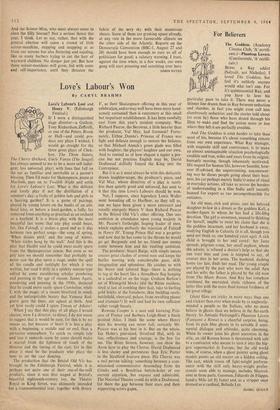Love's Labour's Won
By CARYL BRAHMS
Jr I were a distinguished stage director—a Guthrie, Tony Richardson,Zeffirelli, or one of the Peters, Brook or Hall—and could pro- duce any plays I wished, I would go straight for the three great plays of Chek- hov, The Three Sisters, The Cherry Orchard, Uncle Vanya (The Seagull has always seemed to me to be a more self-indul- gent, less universal, play), with lines that fall on the ear as familiar and inevitable as a parent's blessing. Then I'd make for Shakespeare, pause at Macbeth, pass on to Twelfth Night and settle for Love's Labour's Lost. What is this delicate and lovely play if not the distillation of a summer's day; a frolic of golden lads and girls in a basking garden? It is a game of pairings, played by young lovers on the banks of an arti- ficial lake, or before a knot-garden, a folly, far removed from anything so practical as an orchard or a hayfield. It is a brave play with the most beautiful last scene that any play could boast, for, like Falstaff, a' makes a good end as it dies between two perfect songs—the song of spring, 'When daisies pied,' and the song of winter, 'When icicles hang by the wall.' And this is the play that Hazlitt said he could most easily spare from the Shakespearian canon. But even as we pity him we should remember that probably he never saw the play upon a stage, under the spell of the candle and rushlight for which it was written, but read it drily in a spidery uneven type edited by some mouldering scholar pondering and penning in the age of reason. James Agate, pondering and penning in the 1930s, declared that he could more easily spare Cymbeline, while I, with the magic of a recent Stratford in mind, and the unforgettable beauty that Vanessa Red- grave gave the lines, am aghast at both. And yet how easily could I spare Timon of Athens!
When I say that this play of all plays I would choose, were I a director, to direct, I do not mean to suggest that it would be easy, for this is by no means so, but because at heart it is less a play with a beginning, a middle and an end, than a pervasive atmosphere. To catch its simple tale and toss it onwards scene by scene should make a marvel from the lightness of touch of the director and the timing of the cast; for in this piece it must be the producer who plays the tune to set the cast dancing.
The production that the Bristol Old Vic has brought to the Edinburgh Festival, while it is perhaps not quite one of their run-of-the-mill products, since it was first staged at Bristol's beautiful eighteenth-century toy, the Theatre Royal in King Street, was ultimately intended for a transcontinental tour, together with Henry V. as their Shakespeare offering in this year of celebration, and so may well have been more hand- somely costumed than is customary at this small but important establishment. It has been carefully cast from this year's resident company. Was Richard Pascoe, the Berowne, a little heavier than the producer, Val May, had foreseen? Fortu- nately, Eithne ,Dunne's Princess of France was light and delicate enough to restore the balance, so. that Michael Annals's green glade was filled with laughter; the players' laughter and our own. And to remind us of how elegant a rapier a pre- cise but not precious English may be, David Dodimead skilfully fenced the King into the Centrepiece.
But it is as it must always be with this delicately drawn laughter-scape, the producer's piece, and Val May, whose direction of a play is rarely less than quietly good and unfussed, has seen to it that this time Love's Labours should be won.
Not, I suppose, since legendary Lewis Waller went bounding off to Harfleur, so they tell us, can we have been given a more extrovert and vocally energetic Henry V than Richard Pascoe in the Bristol Old Vic's other offering. One sees ambition in attendance upon young majesty in Mr. Pascoe's forthright, leaping leader of men, which explains perfectly the rejection of Falstaff in Henry IV. Young Prince Hal was a go-getter and now that he has come to the throne he would go get Burgundy and let no friend nor enemy come between him and his vaulting ambition.
The producer, Stuart Burge, with simple means creates great clashes of armed men and keeps the battles moving with considerable pace, skill, imagination and splendour. He catches us with his brave and tattered flags—there is nothing to tug at the heart like a threadbare flag hanging in a cathedral or on the stage. Graham Barlow's set of Rhinegold blocks (did the Rhine maidens, tired at last of combing their hair, take to hurling gold bricks at the foreshore, thus building castle, battlefield, vineyard, palace, from revolting planes and crannies?) lit well and had its own sufficient rather rough beauty.
Rowena Cooper is a neat and knowing prin- cess of France and Barbara Leigh-Hunt a finely pointed Alice. I think the scene where Henry does his wooing can never fail; certainly Mr. Pascoe was at his best in it. But on the whole, Ian Holm's pint-sized, Stratford Hal, with its fun, reflectiveness and courage, is the boy for me. The River Severn, however, can show the Avon how to play the Chorus. David Dodimead is less showy and portentous than Eric Porter in the Stratford bravura piece. His Chorus was a real person talking; something between a com- missioned communicator descending from the Greeks and a Brechtian button-holer of our current attention, but express and admirable. The National Theatre could do with a Dodimead, for there the gap between their stars and their supporting actors gapes.






































 Previous page
Previous page